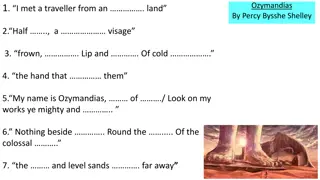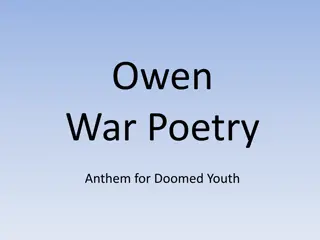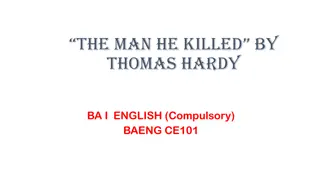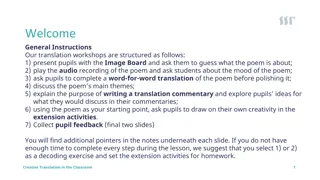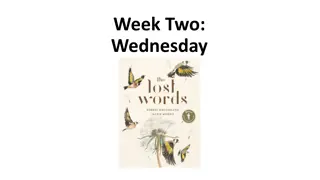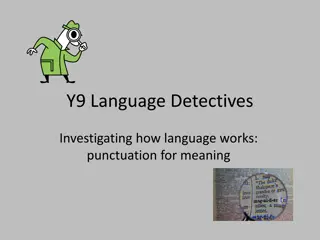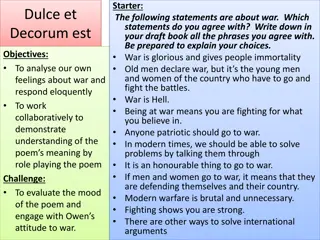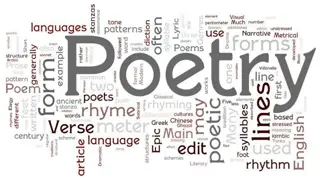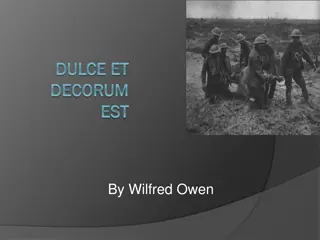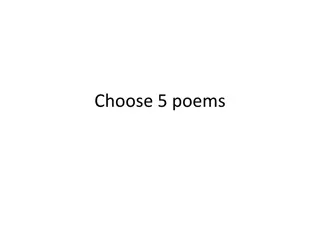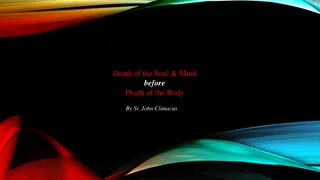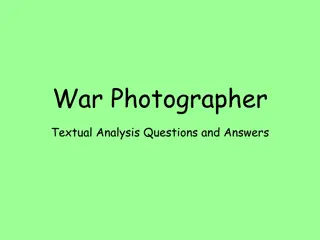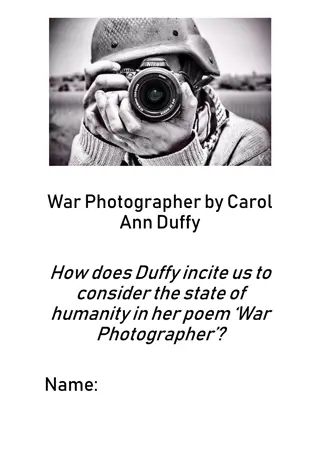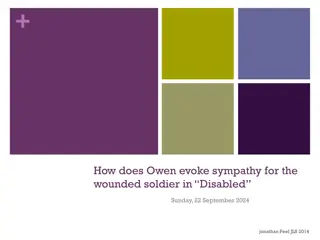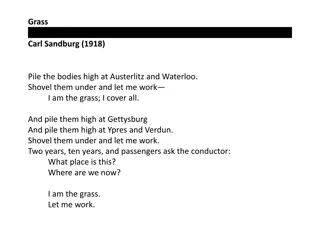Insensibility - A War Poem by Wilfred Owen
Wilfred Owen, a renowned English poet and soldier of World War I, delves into the theme of desensitization and numbness experienced by soldiers in the horrors of war through his powerful poem "Insensibility." The poem reflects on the loss of sensitivity and emotional detachment that soldiers develop to cope with the brutality of warfare, portraying the paradox of finding happiness in the numbing of emotions amidst the chaos and destruction. Owen's poignant verses shed light on the psychological toll and inner conflicts faced by those who have witnessed the unimaginable in the battlefield.
Download Presentation

Please find below an Image/Link to download the presentation.
The content on the website is provided AS IS for your information and personal use only. It may not be sold, licensed, or shared on other websites without obtaining consent from the author.If you encounter any issues during the download, it is possible that the publisher has removed the file from their server.
You are allowed to download the files provided on this website for personal or commercial use, subject to the condition that they are used lawfully. All files are the property of their respective owners.
The content on the website is provided AS IS for your information and personal use only. It may not be sold, licensed, or shared on other websites without obtaining consent from the author.
E N D
Presentation Transcript
Insensibility WILFRED OWEN
Author - Introduction Wilfred Edward Salter Owen Born -18 March 1893, England Died - 4 November 1918 (aged 25) He was an English poet and soldier. He was one of the leading poets of the First World War.
His war poetry on the horrors of trenches and gas warfare was much influenced by his mentor Siegfried Sassoon His best-known works are Dulce et Decorum est , Insensibility , Anthem for Doomed Youth , Futility , Spring Offensive and Strange Meeting .
POEM Happy are men who yet before they are killed Can let their veins run cold. Whom no compassion fleers Or makes their feet Sore on the alleys cobbled with their brothers. The front line withers. But they are troops who fade, not flowers, For poets tearful fooling: Men, gaps for filling: Losses, who might have fought Longer; but no one bothers.
And some cease feeling Even themselves or for themselves. Dullness best solves The tease and doubt of shelling, And Chance s strange arithmetic Comes simpler than the reckoning of their shilling. They keep no check on armies decimation
Happy are these who lose imagination: They have enough to carry with ammunition. Their spirit drags no pack. Their old wounds, save with cold, can not more ache. Having seen all things red, Their eyes are rid Of the hurt of the colour of blood for ever. And terror s first constriction over, Their hearts remain small-drawn. Their senses in some scorching cautery of battle Now long since ironed, Can laugh among the dying, unconcerned.
Happy the soldier home, with not a notion How somewhere, every dawn, some men attack, And many sighs are drained. Happy the lad whose mind was never trained: His days are worth forgetting more than not. He sings along the march Which we march taciturn, because of dusk, The long, forlorn, relentless trend From larger day to huger night.
We wise, who with a thought besmirch Blood over all our soul, How should we see our task But through his blunt and lashless eyes? Alive, he is not vital overmuch; Dying, not mortal overmuch; Nor sad, nor proud, Nor curious at all. He cannot tell Old men s placidity from his.
But cursed are dullards whom no cannon stuns, That they should be as stones. Wretched are they, and mean With paucity that never was simplicity. By choice they made themselves immune To pity and whatever moans in man Before the last sea and the hapless stars; Whatever mourns when many leave these shores; Whatever shares The eternal reciprocity of tears
Analysis Insensibility is Owen s longest poem at 59 lines ordered into six stanzas of varying length eleven lines, seven, twelve, nine, ten and finally ten lines. They are numbered 1-6 in Roman numerals, a reflection of the classical mode. This poem has no obvious full rhyme scheme and no clear foundation of metre (meter in American English), but there is a mix of iambic pentameter now and again, as if a distant echo of the steady marching rhythm of the men as they go to or from the battlefield.
So is this a free verse poem? There are arguments for and against. Perhaps the important point to note is that the poet is experimenting with form, lineation, rhythm and rhyme a quick glance shows that most of the end words in each stanza are para-rhymed, that is they have close vowel and consonant rhymes The six separate stanzas represent the six categories or types of insensibility, although some argue for three categories : the happy, the wise and the cursed.
Major Themes in Insensibility Death, sufferings, and warfare are the notable themes of this poem. Throughout the poem, the speaker tries to explain the true emotions and sufferings of the people taking part in battles. Though they are aware of their possible death, they happily hide their fear and emotions. Their primary focus is to fight in the war as if the war is part of them. They do not even care about their lives. The speaker also talks about the attitude of the world toward surviving soldiers. Sadly, no one understands the damage war brings or sees their wounded soul. Soldiers spend their lives, perplexed after witnessing death and pain. Soldiersmes difficult for them to catch the normal pace of their lives.
Poetic Devices Stanza: A stanza is a poetic form of some lines. There are six stanzas in this poem, each varies in length. Free Verse: Free verse is a type of poetry that does not contain patterns of rhyme or meter. This is a free-verse poem with no strict rhyme or meter
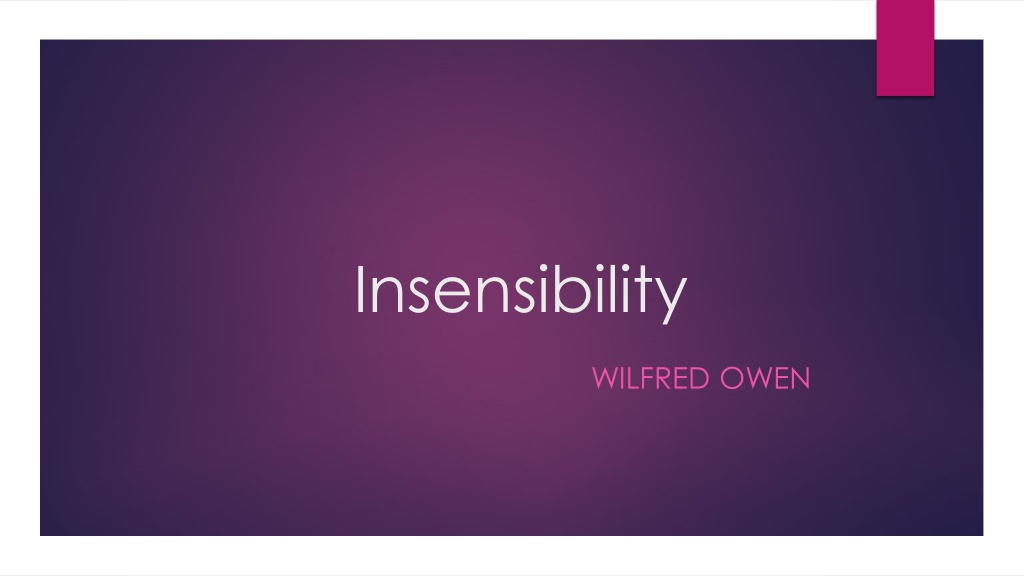
 undefined
undefined




